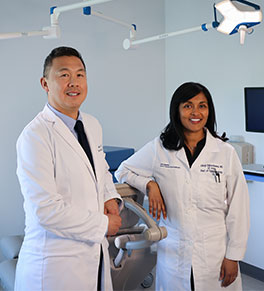
Traumatic Brain Injury
If you sustain a serious blow to your head, a traumatic brain injury can alter how your brain works. Our expert team is committed to your long-term care.
Because the severity level impacts your symptoms, we’re ready to treat any physical, cognitive and emotional issue.
TBI symptoms
A mild TBI is called a concussion but even mild TBIs can be serious. The physical signs of a concussion can include:
- Headache
- Vomiting
- Nausea
- Lack of motor coordination
- Dizziness
- Difficulty balancing
- Light-headedness
- Blurred vision
- Ringing in the ears
- Bad taste in the mouth
- Fatigue or lethargy
- Changes in sleep patterns
Cognitive and emotional symptoms
Emotional and cognitive issues can appear such as:
- Behavioral or mood changes
- Confusion
- Trouble with memory
- Trouble concentrating or thinking
Symptoms of more severe traumatic brain injury
Blunt impact or an object that enters your head causes severe traumatic brain injuries.
Signs of severe trauma include:
- A persistent headache that does not go away
- Repeated vomiting or nausea
- Convulsions
- Inability to awaken
- Dilation of one or both pupils
- Slurred speech
- Aphasia (difficulty finding words)
- Muscle weakness that causes disordered speech
- Weakness or numbness in the limbs
- Loss of coordinationConfusion
- Restlessness or agitation
Other symptoms of severe TBI include:
- changes in appropriate social behavior
- lack of social judgment
- problems with sustained attention, information processing and executive functioning

Managing a TBI means treatment for both body and mind
No matter how severe or mild the impact, you must get evaluated after a blow to your head. Our TBI experts are prepared to meet every symptom you have.
Call 714-456-6966 now to speak with a TBI doctor.

Find a neurology clinical trial
Talk to your doctor to see if a neurology clinical trial is right for you.
Featured Blog Posts

Delicious, diabetes-friendly meals

Parkinson’s disease: Knowledge is power

Getting help for thyroid eye disease
TBI diagnosis at UCI Health
It is vital that you seek immediate medical attention after a head trauma to help avoid long-term brain injuries and future complications.
To diagnose your TBI we test your:
- vision
- memory
- balance
- brain and
- psychological function
We also search for more subtle symptoms like personality changes. It’s important to let us know if you’ve had previous blows to your head.
During your initial evaluation, we may:
- Diagnose and treat acute brain injury
- Evaluate chronic, persistent symptoms
- Counsel athletes who want to continue playing in their sport
Diagnosing severe traumatic brain injury
Our clinicians provide care in our dedicated clinic and emergency department, as well as in our specialized Neuroscience ICU for severe neurological issues.
For severe traumatic brain injuries, we use invasive multimodal monitoring by placing monitors in the head to observe brain activity in real time. This helps us assess oxygen levels, blood flow, and nutrient delivery to brain tissue.
This essential diagnostic tool allows us to track the evolution of a severely injured brain and informs our strategies to prevent further damage.
How we work together to diagnose and treat TBI
We work collaboratively across many disciplines. To assess all your symptoms, we work with:
- Neurological surgeons
- Neurologists
- Neuro ophthalmologists
- Neuropsychologists
- Psychologists
- Speech therapists and others
Who’s at risk for traumatic brain injury?
Anyone can get a TBI from a fall, accident or violent attack.
Athletes are at a higher risk for concussion or TBI, and so are very young children and adults over 65.
What to do if you’ve been hit in the head
Get an evaluation right away, preferably from a neurologist who specializes in TBI. Sometimes a mild TBI only requires an extended period of rest and close monitoring. It may repair itself in time.
When an object penetrates your head, it’s an emergency.
Call 911 in an emergency or go to a hospital emergency room.
TBI treatment at UCI Health
You can visit us in our medical office, the only TBI/concussion location of its kind in Orange County.
We may work with you in the emergency room or the Neuro-ICU. If not and you have a TBI, you’ll be referred to our clinic within a month of your ER visit. Your primary care doctor of neurologist may refer you to us.
After running many diagnostic tests and asking you to fill out a comprehensive questionnaire, we’ll determine what treatments you need.
Don’t underestimate the role of rest as a crucial TBI recovery strategy.
How you benefit from treatment
An impact to your head that’s strong enough to shake or twist your brain creates a TBI. This can cause severe bruising or bleeding. That can lead to serious long-term complications affecting your thinking, behavior and feelings.
We’re here to help you restore clear thought, improve your speech and physical movement. Counseling, emotional processing and relief are key components of our holistic approach.
We address all your symptoms. Our clinic has the distinct advantage of easy access to a wide range of superb specialists. Each one facilitates a facet of your recovery.
Why choose UCI Health for TBI care?
Our monthly team conference strategizes about your treatment
We meet monthly to compare notes about each case, including yours.
As neurology, speech, psychiatry, ophthalmology and surgical clinicians, we share multiple points of view about treatment. That’s how we can offer such comprehensive care.
Our clinic treats a high volume of patients
That bank of experience helps us interpret subtle symptoms that doctors without our training miss.
Full-service concussion care is rare
As the only adult concussion facility in Orange County, we accept referrals for concussion patients from primary care doctors, sports medicine doctors and other neurologists including working athletes.
Our approach is both traditional and holistic
We use evidence-based methods to monitor your progress, but we also consider your feelings and experiences to guide your care.
Upcoming Events
4-5 p.m. +3 more dates
Stroke Prevention
9-9 a.m. +3 more dates
Prevención del Accidente Cerebrovascular
Las clases de prevención del accidente cerebrovascular ofrecidas por UCI Health ofrecen educación a la comunidad sobre los signos y síntomas del accidente cerebrovascular, así como prevenir y tratar un accidente cerebrovascular.
6-7 p.m. +6 more dates




